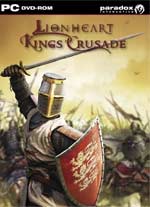Deep Strategy
At first glance, Lionheart: King’s Crusade might appear a complete rip-off of the Total War series, but it isn’t. Rather than providing a multi-faceted game involving combat, empire building, diplomacy, and huge maps, with timelines spanning across thousands of years, Lionheart takes a focused approach to a similar style of RTS.
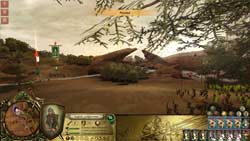
The first thing players will notice is that there are only two factions you can play: the Crusaders, which are made up of almost entirely English forces led by King Richard, and the Saracen, which are made up of Arabian forces led by Saladin. You can play either the campaign or a scenario, which allows you to choose any number of units and go head-to-head against another army on any of the maps available in the campaign.
The campaign isn’t so much split into two and told from different perspectives as it is linear. There is also a larger focus on historical storytelling in the campaign. For example, each portion of the map has historical information that becomes available when you click on it, often in the form of history from the first Crusades. Playing as the Crusaders is the first portion, while playing as the Saracen is the second. While you can play as the Saracen first, the events of the Crusader campaign take place before it and also include the tutorial.
The campaign begins with your forces landing north of Jerusalem. The first battle plays out in the form of tutorial and introduces you the various menus and units that you’ll be using. During this tutorial, the player is introduced to the other factions that represent the Crusaders, which include France, the Holy Roman Empire, the Templar, and the Papal Court. Each faction gives you a different objective for each mission and you’re required to pick one to achieve. Of course, this has diplomatic repercussions. For instance, choosing to complete France’s recommended objectives will result in the player receiving specific types of bonuses to his or her army. Each factions grants a different set of bonuses with each objective you complete, so picking which factions to work with is critical in your long-term plan.
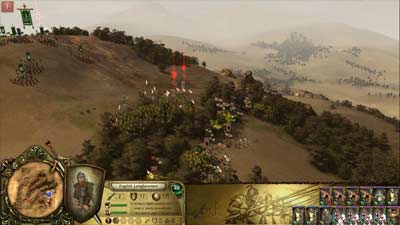
Lionheart also places a great deal of emphasis on army management, but not just how many of each type of unit to bring with you. Instead, the game keeps track of each individual unit, which will increase in experience the longer you can keep them alive. As they gain experience, they get more powerful and can be upgraded. Moreover, you can train specific types of units that can be attached to already existing units, such as healers. Each add-on unit gives a different bonus to the unit it’s attached to, which can give you an advantage on the battlefield. Knowing which specialty units to attach to what is part of the strategic depth.
The game’s focus isn’t entirely on having a bigger or more experienced army either. It also includes a pre-battle system that involves a bit of thought and strategy. Included in these actions are things like sabotaging the city walls, which make it easier for your siege units to break through or assassinating a high-priority target, which decreases the morale of the opposing army. Unfortunately, it isn’t as simple as just performing all these pre-battle actions every time, as they cost Ducats to perform, which also happens to be the currency you use to recruit a larger army, train specialty units, and upgrade existing units. Therefore, you could spend some of that currency on sabotaging the walls, or you could use it to recruits an extra two units of cavalry to deal with any flanking enemies. Knowing what to spend your Ducats on before every battle is part of the challenge, and the pre-battle actions make it more complicated, but also more fun.
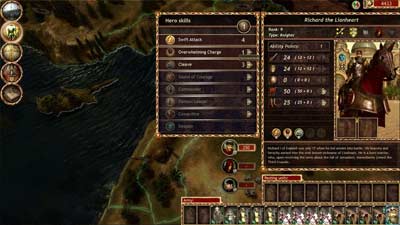
Similar to the real Crusades, much of the fighting is over holy relics as much as it is land. Throughout the game, the player will receive different relics as it defeats the enemy armies and takes territories. However, the relics are much more than just battle trophies—they can be equipped to grant special bonuses or sent back to your homeland for extra Ducats and greater standing with the other Crusader factions. You can only equip one holy relic at a time and each one grants a different bonus, so picking whether to keep and use them or send them back will play a role in determining your success.
While the campaign is a rather linear experience when compared to games found in the Total War series, it does allow for the player to “alter history.” There is no strict adherence to historical events as they happened so the player can determine his or her own outcome, whether it is good or bad.
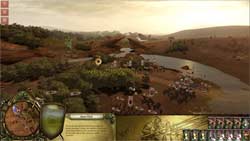
The battles are fought on huge, detailed maps. The visual in Lionheart are on par, if not better than the latest Empire: Total War offering. Cities look massive and intricate, even if much of it can’t be navigated due to map boundaries. Rolling hills and variations in terrain make for good eye candy while also providing an extra layer of strategy. For example, different types of units perform differently depending on terrain and weather conditions. Archers are less effective in fog and rain, while heavily armored knights are less effective in the desert due to the heat and sand. Knowing where to position your units and when to engage them is crucial.
One area that seems to be lacking in Lionheart, however, is the animations, which seem weak overall. Units running at a fast pace can look awkward and silly. Moreover, when units collide with one another, the battle animations don’t actually kick in until after the first few lines of infantry run past each other, which can make for some odd-looking engagements. And, when units do begin swinging at each other, it doesn’t look authentic. For example, infantry will swing their swords even when they aren’t next to an enemy infantry unit. If you’re hoping to zoom in and see the battle carnage up close, you may be a bit disappointed.
There is a multiplayer feature that plays very much like the scenario battles, but it doesn’t involve the same level of progression as the campaign. There are two modes available: Domination, where each player starts with the same amount of gold to spend on units; and Attacker vs. Defender, where the attacking player gets more gold to spend, but the defender gets to set-up interesting traps such as oil splashes before the battle begins. And, while relics can be purchased and added to an army to give bonuses in the multiplayer, individual unit progressions is not present, so everyone’s units are essentially the same unless gold is used to purchase specialty units.
The background music does a decent job of fitting the era and mood, but the voice acting is terribly corny and, in some cases, strange. For example, the advisor from the Papal Court, who also instructs you during the tutorial, has a sarcastic and condescending tone. Moreover, you won’t find the same level of authenticity as a game like Civilization V because all the factions speak English and attempt an accent, rather than speaking their native language. On the other hand, these are minor complaints when looking at the gameplay.
Lionheart: King’s Crusade is a historical RTS in the same vein as the Total War series. It features large battlefields populated with thousands of units that can result in some interesting and fun moments. Its focused, historical angle should be enticing to anyone interested in this particular era and series of conflicts. It doesn’t feature the empire and civilization building aspects of gameplay, but they don’t seem like missing pieces of a puzzle with the unit progression and upgrade system. In the end, this is a game for RTS fans and history buffs who enjoy a nice amount of strategy and thinking. If you’re more a fan of the Total War series and are not sure about Lionheart, the recently released demo is your best bet.
RATING OUT OF 5 RATING DESCRIPTION 3.5 Graphics
Highly detailed visuals that scale well are only slightly hindered by sometimes awkward animations. 2.5 Control
Fairly traditional controls are hurt by a difficult-to-control camera and the user interface getting in the way of mouse dragging units on the screen. 3.0 Music / Sound FX / Voice Acting
Quality but forgettable music suits the game well, but bad and condescending voice acting can be funny and then just strange. 3.0 Play Value
The campaign provides the core experience, despite being somewhat linear. The scenario and multiplayer features allow for replayability, but limiting battles to just 1 vs. 1 seems limiting. 3.2 Overall Rating – Fair
Not an average. See Rating legend above for a final score breakdown.
Game Features:
